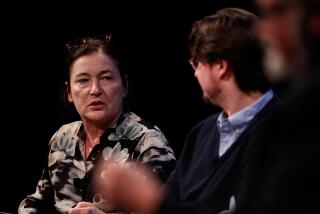Inspired by actual events
ALREADY embraced by an enthusiastic readership and critics, Colum McCann affirms with “Zoli,” his fourth novel, that he is a writer with a method and a mission. His method, of projecting a historical milieu and true lives into a freely constructed story, shucks off the shackles of traditional “historical fiction.” His mission -- nothing less than to illuminate the phenomenon of artistic creativity -- emerged clearly in his previous novel, “Dancer.” That impressionist portrait of the prodigiously gifted Rudolf Nureyev implicitly asked: What is creativity’s source? What does it mean, to make art? What price does a dedicated artist pay? Hardly minor questions, their challenge having fascinated writers since Pygmalion fell madly in love with his statue.
McCann’s quest continues unabated in “Zoli.” The timeline is mainly World War II and the Cold War years that followed. The place, mainly Czechoslovakia. The romantic, colorful, tortured artist whose life the novel traces is a Roma, or Gypsy, woman, a poet-singer who miraculously learned to read and write in what was then a proud but vastly illiterate culture, reviled by the “settled” folk, oppressive toward its women. In other words, fictional Zoli, who survives the Nazi extermination efforts and reaches intoxicating heights of popularity and fame by the time she’s 30, is even more of a rebel and outsider than Nureyev was.
McCann’s heroine draws much from the documented life of the Polish Roma poet known as Papusza, who according to various sources lived from 1908 to 1987. According to the author’s acknowledgments, Zoli is only “loosely inspired” by Papusza. But a cursory flight over the real person’s biography turns up many striking incidents and images from “Zoli”: a hidden childhood life of letters, singing with harps, traditional marriage at a tender age within the clan, hiding in the forest from Nazis, the fateful encounter with a poet-publisher convinced of her genius, the way her song-poems contributed propaganda support to the government’s forced settlement of the Wandering People, the highly dramatic -- and feverishly dramatized -- turning point when she fought too late to have her book withdrawn from publication, her subsequent trial by the Roma elders and their devastating condemnation of her as mahrime (polluted), ostracism from the community for life: All this was Papusza.
To what extent, then, can “Zoli” be considered an act of the author’s imagination? True, there is the transposition of the poet’s homeland, for reasons known only to McCann, from Poland to Czechoslovakia. There are a host of made-up supporting roles, most memorably the noble and wise Marxist grandfather who teaches orphaned Zoli to read with the help of a tattered copy of “Das Kapital.” There are the two fictional love interests, as well as a daughter who turns up at the close to warm Zoli’s final days and provide the novel with a bridge to our own time. Finally, there is the author’s effort to inhabit the mind and body of a unique woman, to know how it all felt, whether writing about her wedding night at 14, her incarceration in a displaced persons camp or the exaltation of creating a song.
It appears worthwhile to try to winnow fact from fiction, out of respect for lives lived. Beyond that, does it matter? Arguably, a novel can and should be judged solely by what’s between its covers. On that basis, what experience does “Zoli” impart? Despite the bio-fiction approach, McCann’s great strength is his grasp of the big picture. The novel’s power resides in its midsection, as told from the adult Zoli’s point of view and that of her hopelessly besotted English lover. Here the Roma hardships under the Nazis, their hopes and cruel disillusion under Communism, are grittily conveyed in scenes well researched and often gripping.
One might, however, merely skim the first hundred-odd pages, where cliches of present-day exotic Roma poverty are followed by Zoli’s childhood memories of a tritely ideal lost Eden, conveyed in an archly archaic diction. And, in a book that looks at the perils of creativity, the ending is disconcerting. It has nothing to do with the poet Papusza’s grim exile, endured alone -- but it’s neat and upbeat, and would play well in a film. *
More to Read
Sign up for our Book Club newsletter
Get the latest news, events and more from the Los Angeles Times Book Club, and help us get L.A. reading and talking.
You may occasionally receive promotional content from the Los Angeles Times.







